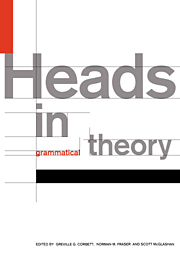Book contents
- Frontmatter
- Contents
- List of contributors
- 1 Introduction
- 2 The head of Russian numeral expressions
- 3 The phonology of heads in Haruai
- 4 Patterns of headedness
- 5 Head-hunting: on the trail of the nominal Janus
- 6 The headedness of noun phrases: slaying the nominal hydra
- 7 Head- versus dependent-marking: the case of the clause
- 8 Heads in discourse: structural versus functional centricity
- 9 Heads in Head-driven Phrase Structure Grammar
- 10 Heads and lexical semantics
- 11 Heads, parsing and word-order universals
- 12 Do we have heads in our minds?
- 13 Heads, bases and functors
- References
- Index
5 - Head-hunting: on the trail of the nominal Janus
Published online by Cambridge University Press: 23 February 2010
- Frontmatter
- Contents
- List of contributors
- 1 Introduction
- 2 The head of Russian numeral expressions
- 3 The phonology of heads in Haruai
- 4 Patterns of headedness
- 5 Head-hunting: on the trail of the nominal Janus
- 6 The headedness of noun phrases: slaying the nominal hydra
- 7 Head- versus dependent-marking: the case of the clause
- 8 Heads in discourse: structural versus functional centricity
- 9 Heads in Head-driven Phrase Structure Grammar
- 10 Heads and lexical semantics
- 11 Heads, parsing and word-order universals
- 12 Do we have heads in our minds?
- 13 Heads, bases and functors
- References
- Index
Summary
Introduction
This chapter poses the question: ‘What is the head of modified nominal structures such as good students, these students or many students}’ The answer I shall give here is one inspired by classical mythology: namely, that like the ancient Roman god Janus, such structures are double-headed. The theoretical framework used here will be that of Government-Binding theory; the specific descriptive claim being made is that modified nominals incorporate multiple phrasal projections (with each modifier heading a separate projection), and that each phrasal ‘layer’ of the structure comprises both an immediate head (the modifier) and an ultimate head (the modified N): thus, for example, the immediate head of the expression ‘good students’ is the Adjective good, but its ultimate head is the Noun students. The analysis will proceed in a bottom-up fashion: accordingly, I start by looking at the innermost NP ‘core’ of nominals.
The internal structure of Noun Phrases
Consider the internal structure of nominals such as the following:
(1) a. ministry of defenceinstructionsto all employees
b. governmentcriticismof the press
c. Labour Partypolicyon defence
d. military policeinvolvementin torture of prisoners
e. university managementallegationsof a concerted student campaign of disruption
f. European Communitydemandsfor monetary union
g. studentassessmentof lectures
h. Department of the Environmentplansfor a new motorway
The overall string in such examples is traditionally considered to have the categorial status of a Noun Phrase: its head in each case is clearly the capitalized Noun, since the number properties of the capitalized Noun determine the number properties of the overall nominal, so that, for example, a nominal such as Ministry of Defence instructions…
- Type
- Chapter
- Information
- Heads in Grammatical Theory , pp. 73 - 113Publisher: Cambridge University PressPrint publication year: 1993
- 16
- Cited by



